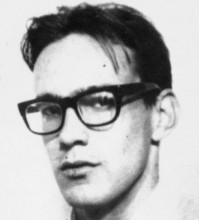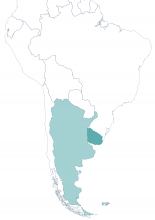Carlos Federico Cabezudo was born in Mercedes, Soriano Department (Uruguay) on 27th April 1948. He played chess competitively as a young champion, representing Uruguay in the 1967 World Chess Tournament in Israel. He was a student at the Engineering Faculty of the University of the Republic and worked as a maths and art teacher at the José María Campos I High School in Mercedes and the Labour University of Uruguay in the Rocha Department.
In his home city, Mercedes, he became active in the teachers' union and the Partido Comunista Revolucionario (Communist Revolutionary Party, PCR). Repression against the PCR had intensified during the months before the 1973 coup d'état, leading Uruguayan militants, including Carlos, to seek exile in Argentina. Carlos there became a member of the PCR Central Committee's Permanent Bureau, joining other leaders, such as Nebio Melo and Winston Mazzuchi.
In August 1973, an internal document by the Uruguayan army called for Carlos Cabezudo and nine other people to be captured.
In April 1977, Carlos' daughter was born in Argentina. That November, an Argentine citizen and leader of the Montoneros guerrilla group was arrested at the Port of Colonia (Uruguay). Members of the Escuela Superior de Mecánica de la Armada (Argentine Navy Mechanics School, ESMA) started making their way across the border.
From 21st December 1977, officials of the Uruguayan Cuerpo de Fusileros Navales (Naval Fusiliers Corps, FUSNA) went to neighbouring Argentina. Declassified documents also show that members of the Uruguayan Servicio de Información y Defensa de Uruguay (Defence Information Security, SID) increased in Argentina during this period.
On the early morning of 30th December 1977, a group of heavily armed agents dressed as civilians broke into the Buenos Aires apartment where Carlos lived with the married couple, Juvelino Carneiro and Carolina Barrientos.
The agents beat the three victims and ransacked their home in the neighbourhood of Parque Chacabuco. They then set up a 'mousetrap' (ratonera) that remained behind closed doors for several days. When the neighbours from the apartment building tried to get closer to see what was happening, they were threatened and forced to shut themselves away. The abduction is attributed to the Policía Federal Argentina, Coordinación General (General Coordination of the Argentine Federal Police, PFA).
A document dated 9th January 1978 from the SID was found in the declassified archives of the Ministry of Foreign Relations of Uruguay and used as judicial evidence. The archival material revealed that the agents had identified the PCR's Central Committee members. They had tracked Carlos down to Buenos Aires and demanded his capture for his involvement in the PCR.
Carlos, Juvelino and Carolina were sighted in three clandestine torture and detention centres in Argentina: 'COT1 Martínez', 'Pozo de Quilmes' and 'Pozo de Banfield'. Carlos presumably could have been secretly transferred to Uruguay in February 1978. Survivors indicated that they would have identified him in the Montevideo clandestine detention centre, known as the 'Base Roberto' or 'La Tablada': the operating site of the Organismo Coordinador de Operaciones Antisubversivas (Coordinating Organism for Antisubversive Operations).
Carlos' disappearance was investigated in the 2007 court case which charged the Uruguayan dictator, Gregorio Álvarez, and the retired captain, Juan Carlos Larcebeau. His case was also probed by the Italian Condor Trial. The retired captain, Jorge Nestor Troccoli, was charged with Carlos' homicide. The whereabouts of his disappearance, including whether it occurred in Uruguay, remain unclear.


